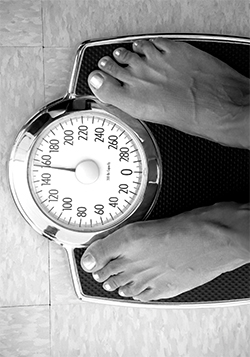Does Fasting Work For Fat Loss?

Fasting: Is it a miraculous way to improve your health and lose fat … and maybe even improve muscle mass? Or is it just another fad diet?
 Figuring out if fasting is an effective diet strategy has a few problems. The first is that there isn’t enough research and the research that exists isn’t conclusive. Second, it’s pretty well established that reducing calorie intake probably reduces disease risk and prolongs lifespan. It’s difficult to say whether fasting’s effectiveness is because of eating less food or eating less food less frequently. Finally, some research suggests that eating small meals often—the typical “bodybuilder” six to eight meals per day, which is basically the opposite of fasting—is best for body composition and health. However, despite the lack of certainty, fasting is a fascinating topic, as I’ll try to elucidate.
Figuring out if fasting is an effective diet strategy has a few problems. The first is that there isn’t enough research and the research that exists isn’t conclusive. Second, it’s pretty well established that reducing calorie intake probably reduces disease risk and prolongs lifespan. It’s difficult to say whether fasting’s effectiveness is because of eating less food or eating less food less frequently. Finally, some research suggests that eating small meals often—the typical “bodybuilder” six to eight meals per day, which is basically the opposite of fasting—is best for body composition and health. However, despite the lack of certainty, fasting is a fascinating topic, as I’ll try to elucidate.
From a health perspective, the top experts on fasting believe it has benefits. Research does seem to indicate that periodically going long periods without food (16 or more hours) reduces inflammation, reduces the activity of some pathways in the body that may be unhealthy, and stimulates a process called autophagy. Autophagy literally means “eating yourself,” which initially sounds like a bad idea, but actually, when on a prolonged fast, the body preferentially “eats up” and breaks down unwanted, old and decrepit tissue and, when food is next consumed, this stimulates the preferential regeneration of those tissues. This may be the mechanism behind the results of one small pilot study that showed greater losses of total fat and better muscle growth following a fasting diet compared to a normal, low-calorie diet.

Based on the above, fasting is great, right? Well, not so fast. As I said above, just limiting calories is healthy and maybe for many of the same reasons as fasting. Also, if we’re considering muscle mass—as most Muscle Insider readers will be—it’s a fact that the body can go into “anabolic” mode every three to four hours. This is behind the long-standing advice to athletes to eat at least 20 grams of high-quality protein frequently, thus stimulating the muscle-building process of protein synthesis as often as possible, resulting in better growth and repair. But what about what happens in real life? Well, I tried fasting and not just for 16 hours—I went from Sunday night until Wednesday morning and noticed a number of things. Firstly, I felt mostly fine and my weight-training workouts didn’t suffer, but on day three, my cardio felt way harder than usual (perhaps not surprisingly). My Fitbit reported that I had very little REM sleep, and I experienced reduced libido after day two. Otherwise, I found it to be a good experience. I lost body fat, didn’t lose strength, seemed to regain any muscle that I’d lost rapidly after eating again, and felt great.
But what about what happens in real life? Well, I tried fasting and not just for 16 hours—I went from Sunday night until Wednesday morning and noticed a number of things. Firstly, I felt mostly fine and my weight-training workouts didn’t suffer, but on day three, my cardio felt way harder than usual (perhaps not surprisingly). My Fitbit reported that I had very little REM sleep, and I experienced reduced libido after day two. Otherwise, I found it to be a good experience. I lost body fat, didn’t lose strength, seemed to regain any muscle that I’d lost rapidly after eating again, and felt great.
Of course, that’s just my experience. As with all diets and workouts, everyone responds differently. So if fasting helps you to reduce your calorie intake and makes it easier than just eating less on a daily basis, then go for it. However, let me finish by going back to the science. A recent study compared a fasting diet to a calorie-restricted diet, both with the same calories, and, sorry to be boring, both groups lost the same amount of weight. Although there may be decent arguments both for and against fasting, the only way to determine if it’s for you (at least until more research is done) is probably to try it and see.
Click HERE to sign up for our free newsletter!

